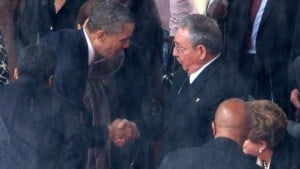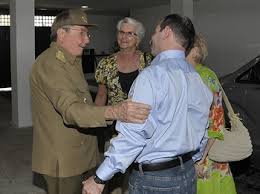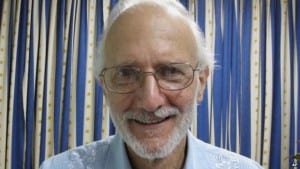On November 3, 2014, one month before his transfer from Victorville prison to Oklahoma on what would be his journey home to Havana, Gerardo Hernández had written a brief, upbeat letter to Walter Lippmann, the editor of Cuba News, a popular, progressive online aggregator of news and information about Cuba. “Today,” he noted with delight, “we woke up with the news about the editorial in the New York Times.”
Although the Times’ editorial’s starting point had been Cuba’s continued imprisonment of Alan Gross, this was not one more of those standard issue, State Department-parroting, mainstream American media, “Alan is a humanitarian do-gooder being held hostage by the dictatorial Cuban regime, which must release him unconditionally and immediately” pontifications.
For starters, this editorial — in the most influential newspaper in America — acknowledged that Alan Gross’s arrest “was the result of a reckless strategy in which [the United States Agency for International Development] has deployed private contractors to perform stealthy missions in a police state vehemently opposed to Washington’s pro-democracy crusade… Mr. Gross traveled to Havana five times in 2009, posing as a tourist, to smuggle communications equipment as part of an effort to provide more Cubans with Internet access…”
There were phrases — “police state,” “Washington’s pro-democracy crusade,” “provide Cubans with more Internet access” — that Gerardo would normally have disputed, but he also immediately grasped the seismic shift in thinking the Times editorial represented.
The editorial, in fact, was actually the fourth in a startling month-long series of Times’ editorials, each one arguing more determinedly for Washington to end to its 53-year embargo against Cuba and press the re-set button on relations between the longtime adversaries.
“At a time when a growing number of officials in Washington and Havana are eager to start normalizing relations,” the November 3 editorial noted, “Mr. Gross’s continued imprisonment has become the chief obstacle to a diplomatic breakthrough. There is only one plausible way to remove Mr. Gross from an already complicated equation.”
The editorial’s next sentence would be its most shocking — and unexpected.“The Obama administration should swap him for three convicted Cuban spies who have served more than 16 years in federal prison.”
The Times went on to explain exactly how — and why — the administration should act. “In order to swap prisoners, President Obama would need to commute the [Cuban] men’s sentences. Doing so would be justified considering the lengthy time they have served, the troubling questions about the fairness of their trial, and the potential diplomatic payoff in clearing the way toward a new bilateral relationship.”
The Times’ call for a prisoner swap, Gerardo marvelled in his note to Lippmann that day, was “something that a couple of months ago we could only be dreaming about.”
In a public sense, that dream had first seemed to assume what might be concrete shape almost a year before. On December 10, 2013, U.S. president Barack Obama and Cuban president Raúl Castro had shaken hands in a was-it-really-accidental? encounter at the funeral of Nelson Mandela.[4] The two presidents were among dozens of world leaders who had come to Soweto’s FNB Stadium to attend a memorial service to honour the legendary South African leader. Obama “bounded up” a set of stairs to the stage and began glad-handing his way through a line of world leaders toward the microphone when he came face to face with Castro. The two men shook hands briefly before continuing their greetings of other leaders.
America’s army of Cuba experts eagerly attempted to parse this momentary mingling of palm on palm. Ted Piconne, director of foreign policy at the Brookings Institution, told the London Telegraph: “it’s a nice symbolic gesture, but not particularly meaningful beyond that.” Julia Sweig, director for Latin America Studies at the U.S. Council on Foreign Relations, offered a more positive spin. “We might look back on this as another milestone,” she said, “a test balloon that both heads of state are throwing up to measure reaction from their publics.”
For their part, White House officials insisted the handshake was accidental, incidental, meaningless. “Nothing was planned in terms of the president’s role other than his remarks,” deputy national security adviser Ben Rhodes told American reporters who had traveled to South Africa with the president. “He really didn’t do more than exchange greetings… on his way to speak. It wasn’t a substantive discussion.”
While that may have been technically true, Rhodes himself understood the larger narrative significance of the gesture better than almost anyone. A former Obama speechwriter, he was at that moment the president’s personal emissary in top-secret talks with senior Cuban officials that had been underway for six months. The unspoken goal of the U.S.-initiated round of talks: to figure out a way to finally re-establish diplomatic and other relations after more than 50 years of failed American policy toward Cuba. Before that could happen, however, both sides understood they would need to resolve two longstanding sticking points. For the Cubans, it was the case of the Cuban Five; for the Americans, Alan Gross. Until those cases were resolved, they could make no real progress on finding common ground on the larger differences between them — from removing Cuba from the list of sponsors of state terrorism, to re-establishing diplomatic relations to ending the 53-year-old U.S. embargo against Cuba. At the time of the Mandela funeral, of course, those discussions were still top-secret — and their outcome was uncertain — so no one was prepared to speak openly about them, or even admit they were happening.
But, even without knowing about the talks themselves, some observers on both sides of the Straits of Florida had begun to sniff new and hopeful signs of a possible rapprochement in the tropical breezes.
The month before the handshake seen round the world, for example, Obama had told a political fundraiser in Florida — of all places — that the United States had to be more “creative, and we have to be thoughtful, and we have to continue to update our policies” on Cuba.
In the fall of 2014, the administration pointedly thanked Cuba for its role in sending doctors to Africa to combat the Ebola outbreak. Samantha Power, the U.S. ambassador to the United Nations, who had just returned from her own fact-finding mission to Liberia, told a panel discussion in New York: “I have to commend Cuba for sending 265 medical professionals early.” Power, a confidante of President Obama, went on to mention Cuba favourably three more times during her talk. That prompted Sir Harold Evans, editor at large for Thomson Reuters, which sponsored the panel, to ask what this might mean for relations between the U.S. and Cuba. “There’s no integrated effort,” Power allowed, “but we’re very grateful to them for doing this.”
And there were other, clearly unrelated but nonetheless significant — and positive —developments. In February 2014, Fernando González was released from prison. It was not a humanitarian gesture. The second member of the Cuban Five to be freed had served every hour of his sentence before being released, then immediately re-arrested under American immigration law and summarily deported back to Cuba. He’d even — one last indignity — been shackled by U.S. marshalls until after his plane finally touched down in Havana.
That said, Fernando’s return — along with the earlier release of René González, who’d also served his full sentence — added two more powerful voices to a growing international chorus for the freedom of the remaining three. By June, Fernando had been appointed vice president of ICAP, the Cuban “friendship-with-the-peoples” organization that helped support and encourage the network of international solidarity groups.
Fernando’s return had another unintended, but not insignificant impact on hopes for a solution. It reduced by one more the number of Cuban prisoners the U.S. would ultimately need to agree to swap in any prisoner exchange.
Meanwhile, in April 2014, a despondent Alan Gross — by then in the third year of his own 15-year sentence — went on a brief hunger strike. He was protesting the disclosure of yet another USAID-funded regime-change project called ZunZuneo — a secretive Cuban Twitter scheme aimed at stirring unrest among Cubans — that had continued even after Gross was arrested and imprisoned. Furious, Gross informed his lawyers and his family he would not celebrate his next birthday in a Cuban prison. The clear implication was that he would rather commit suicide. That ratcheted up pressure on the Obama administration to do whatever was necessary to win his release and, at the same time, reminded Cuban authorities just how vulnerable their best bargaining chip was.
In June, the White House appointed career diplomat Jeffrey DeLaurentis as the new chief of its U.S. Interest Section in Havana. According to his official biography, DeLaurentis had most recently been the U.S. representative for “special political matters,” and, before that, assistant deputy secretary at the State Department’s bureau for western hemisphere affairs. During the early 1990s, he’d even served as head of the political and economic affairs office at the US Interests Section in Havana.
But it was what was not in the official news release that intrigued Gerardo Hernández. “Look him up in Kimber’s book,” he urged Alicia Jrapko. It turned out DeLaurentis had been one of the three key White House Officials officials who met with Gabriel Garcia Marquez, the Nobel-prize-winning Colombian novelist, in May 1998. Garcia Marquez had brought a secret message from Fidel Castro: Miami-based exile terrorists were plotting to attack airplanes carrying tourists to Cuba. That discussion led to an unprecedented meeting in Havana in June 1998 between FBI agents and Cuban State Security. The Cubans believed the FBI agents had agreed to investigate and report back to them. Instead, three months later, the FBI, instead of arresting the plotters, arrested the Five. If anyone in the American administration would understand the case of the Cuban Five, it would be DeLaurentis. Why would the White House appoint him now as the head of its Interest Section in Havana unless…?
During the Five Days for the 5, which took place the same month as DeLaurentis’s appointment, the committee was surprised when State Department officials agreed to meet with them. Previous requests for such a meeting had been ignored. But this time, senior officials, including Raymond McGrath, the State Department’s coordinator for Cuban affairs, and Alex Lee, the deputy assistant secretary for South America and Cuba, met twice with representatives of the group. While there was no “meeting of the minds” at either session, it was clear the officials were at least curious to better understand the growing international movement to free the Five.
Many developments, however, were harder to read. Positive? Negative? On the eve of the Committee’s two-day conference on changing American-Cuban relations, for example, the White House trumpeted the release of an American soldier held captive in Afghanistan. Sgt. Bowe Bergdahl had been freed in exchange for five Taliban prisoners from the Guantánamo naval base. On the one hand, the Obama administration had completed a prisoner swap in order to get one of its own back. Why not strike a similar deal for Alan Gross? On the other hand, allegations the soldier had been a deserter ignited a firestorm of protest in Congress and beyond. Would the administration contemplate another swap — albeit a very different kind of exchange — after enduring the political fallout from Bergdahl?
Set against that crazy-quilt backdrop of hard-to-parse developments, Gerardo Hernández’s sudden, unexpected, unexplained transfer from Victorville to Oklahoma on December 4 might be a positive sign. Or it might not.
“We could be living in some historic moment in terms of US-Cuba relations,” Gerardo himself concluded hopefully — and presciently, as it turned out — in his message to Lippmann, adding even more hopefully, that “the time won’t be good for the Ileanas [Ros-Lehtinen], the Bobs [Menendez], and all the gang that for many years has profited from being hatred advocates.”
Even Gerardo — as he waited in the limbo of the Oklahoma prisoner transfer center waiting to find out what would happen next — still didn’t know the half of it.









 STEPHEN KIMBER, a Professor of Journalism at the University of King's College in Halifax and co-founder of its MFA in Creative Nonfiction Program, is an award-winning writer, editor and broadcaster. He is the author of two novels and eight non-fiction books. Buy his books
STEPHEN KIMBER, a Professor of Journalism at the University of King's College in Halifax and co-founder of its MFA in Creative Nonfiction Program, is an award-winning writer, editor and broadcaster. He is the author of two novels and eight non-fiction books. Buy his books
THE LATEST COMMENTS